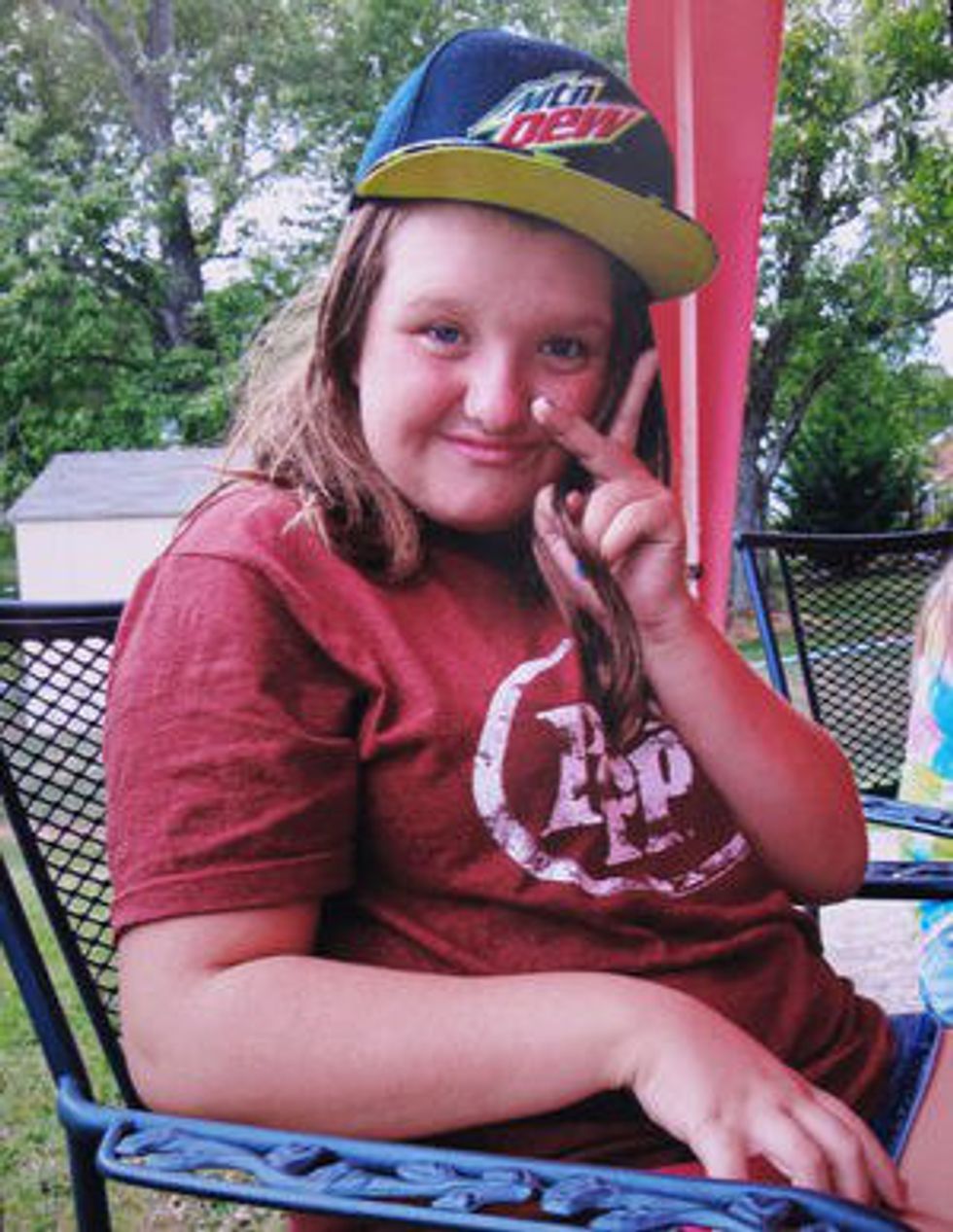Meet Coley.
Nicole Madison Lovell was a thirteen-year-old girl from Blacksburg, Virginia. Her favorite animal was the pandas and her favorite color was blue. She loved music and dancing, and she hoped to compete one day on "American Idol." Her mother, Tammy Weeks, says Nicole was “a very lovable person” who “touched many people throughout her short life.”

Nicole was known by her family members for being incredibly brave, having fought through several major illnesses throughout her childhood. Even though at one point Nicole was given a 1 percent chance of survival, she always, as her mother put it, “beat the odds.”
On January 27, Nicole went missing.
Three days later, on January 30, her body was found on the border between Virginia and North Carolina. She had been stabbed to death.
Police now believe that two Virginia Tech students, David Eisenhauer and Natalie Marie Keepers, had pursued Nicole on social media, convinced her to get into their car, murdered her, and dumped her body on the side of the road.
This is not where the story ends. In fact, it is just getting started.
The media’s coverage of Nicole’s death has been completely irresponsible and problematic. Instead of simply reporting her alleged murder, several news sources have placed blame on Nicole, a 13-year-old panda-lover, for being gullible enough to fall for Eisenhauer and Keepers’ trap. This is victim-blaming, and regardless of your social or political stance on when it is acceptable to blame the victim, I draw the line when a young girl is blamed for an adult’s alleged decision to trick her and kill her.
We can start with this article by Petula Dvorak, published in the Washington Post:
“Near Virginia Tech, a 13-year-old’s online fantasies turn fatal."
Before even starting the article, the title suggests that Nicole’s fantasies were what caused her death, not the fantasies of the adults involved on the other end. In other words, Nicole's dream of meeting her fake boyfriend was what killed her and not Eisenhauer and Keepers' dreams of luring in and killing a young girl.
It only gets worse: Dvorak’s narrative mostly focuses on the ways technology endangers and corrupts today’s children. In Dvorak’s story, Nicole’s story begins when she opens Kik, "a messaging app that has been the bane of law enforcement officials for the last couple of years." Dvorak laments, “It used to be 13-year-olds would cry into their pillows. Or write in rainbow-covered journals, with rainbow pens.” Now, apparently, they are no longer innocent bundles of rainbows: they are worldly, flirty mini-adults who are so weak that they have to turn to social media instead of keeping their struggles private, like kids did Back In Her Day.
The “back in my day” argument is so troublesome because it vilifies the behavior of a child in today’s generation, based on the standards of a generation with totally different life experiences. Nicole does not deserve to be treated as a mini-adult just because she was given the access to technology before members of Dvorak’s generation were.
Furthermore, Dvorak states, "[Nicole] asked [her killers] if she was cute. She flirted with them. She showed them coquettish pictures of herself...She was a flirting, dating teen with lip gloss and great lines. And Nicole did not survive.” In this way, she paints Nicole as an adult figure with risky behavior and a dangerous sexuality. Nicole does not deserve the responsibility of being any of those things. Sure, her actions were not mature, but she was barely even a teenager. She was a child. And this discourse is so irrelevant because her “flirting” and “lip gloss” should absolutely not excuse the fact that she was killed.
Dvorak arguably says more positive things about the accused murderers than she does about Nicole: she tells readers that Eisenhauer is a talented "track star" and engineering student at Virginia Tech, and Keepers is also a future engineer "who once interned at NASA." It is hard to see how these students' résumés are relevant to the murder case.
While this type of victim-blaming reporting was the worst in Dvorak’s article, it can also be found in several of the articles discussing Nicole's death, including this article by the New York Daily News, with the most stomach-turning title I came across:
“Slain Virginia 13-year-old Nicole Madison Lovell had inappropriate relationship with Virginia Tech student David Eisenhauer.”
This title sends the message that Nicole is dead because she went out of her way to form an inappropriate relationship with Eisenhauer. Nicole is the instigator, the main actor in this narrative; Eisenhauer is merely an accessory -- the receiver of Nicole’s actions. Even though Nicole’s relationship with Eisenhauer did result in her death, this could be worded in a much more responsible way: Eisenhauer’s relationship with Nicole allegedly resulted in her death. This would get rid of the passive language that puts the blame on Nicole. This shouldn't even have to be said, but out of the two of them, Eisenhauer deserves much more blame, not only because he is allegedly directly responsible for her murder, but because he is 18 years old, a legal adult, and Nicole was only 13.
Why do we love to blame the victims of horrible crimes like this? Chances are, there might still be a part of your brain that says Nicole does deserve the blame; after all, she did sneak out of the house to meet a strange man – she should have known better, right? I don’t disagree, and I definitely think that parents have the right, and the responsibility, to monitor their children’s interactions with strangers online. However, for some reason, our language always focuses on what the victim, like Nicole, “could have done better” to avoid such a horrible outcome. There is a term for this – the just world fallacy.
The just world fallacy makes us want to believe the world is fair. In this ideal world, bad things happen to reckless people who deserved it, not to innocent people who were prepared. We like to believe this, because the alternative is terrifying. It is easier to pinpoint what Nicole did wrong, or blame her parents for not checking on her, than it is to accept the fact that there are predators out there who can convince anyone – our own little siblings, cousins, and children – to get in the car and drive away with them, no matter how well we think we have prepared them for such a scenario. If we believe in the just world fallacy, we are comforted by the idea - the fallacy - that the people we love are safe no matter what.
It is hard to accept that the world is an unfair and risky place, but it is a necessary burden we must carry in order to provide victims and their families with sympathy instead of placing blame on their already grieving hearts.




 StableDiffusion
StableDiffusion StableDiffusion
StableDiffusion StableDiffusion
StableDiffusion Photo by
Photo by  Photo by
Photo by  Photo by
Photo by 
 Photo by
Photo by  Photo by
Photo by  Photo by
Photo by  Photo by
Photo by  Photo by
Photo by 












